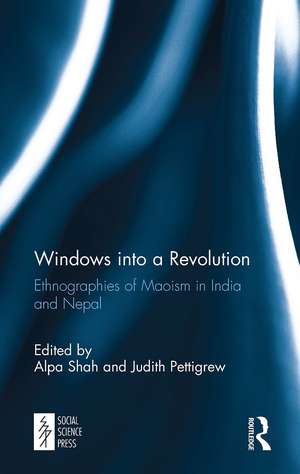Windows into a Revolution: Ethnographies of Maoism in India and Nepal
Editat de Alpa Shah, Judith Pettigrewen Limba Engleză Paperback – 25 iun 2024
Please note: Taylor & Francis does not sell or distribute the Hardback in India, Pakistan, Nepal, Bhutan, Bangladesh and Sri Lanka
| Toate formatele și edițiile | Preț | Express |
|---|---|---|
| Paperback (1) | 259.98 lei 6-8 săpt. | |
| Taylor & Francis – 25 iun 2024 | 259.98 lei 6-8 săpt. | |
| Hardback (1) | 1000.27 lei 6-8 săpt. | |
| Taylor & Francis – aug 2017 | 1000.27 lei 6-8 săpt. |
Preț: 259.98 lei
Preț vechi: 326.49 lei
-20% Nou
Puncte Express: 390
Preț estimativ în valută:
49.75€ • 52.07$ • 41.41£
49.75€ • 52.07$ • 41.41£
Carte tipărită la comandă
Livrare economică 31 martie-14 aprilie
Preluare comenzi: 021 569.72.76
Specificații
ISBN-13: 9781032653013
ISBN-10: 1032653019
Pagini: 350
Dimensiuni: 138 x 216 x 22 mm
Greutate: 0.45 kg
Ediția:1
Editura: Taylor & Francis
Colecția Routledge
Locul publicării:Oxford, United Kingdom
ISBN-10: 1032653019
Pagini: 350
Dimensiuni: 138 x 216 x 22 mm
Greutate: 0.45 kg
Ediția:1
Editura: Taylor & Francis
Colecția Routledge
Locul publicării:Oxford, United Kingdom
Public țintă
PostgraduateCuprins
1. Windows in to a Revolution: Ethnographies of Maoism in India and Nepal — Alpa Shah and Judith Pettigrew 2. In Search of Certainty in Revolutionary India — Alpa Shah 3. The Formation of Political Consciousness in Rural Nepal — Sara Shneiderman 4. Smouldering Dalit Fires in Bihar — George Kunnath 5. Reflections of a One-time Maoist Activist — Sumanta Banerjee 6. Radical Masculinity: Morality, Sociality and Relationships through Recollections of Naxalite Activists — Henrike Donner 7. Women’s Empowerment and Rural Revolution: Rethinking "Failed Development" — Lauren G. Leve 8. From Ancestral Conflicts to Local Empowerment: Two Narratives from a Nep alese Community — Anne de Sales 9. Terror in a Maoist Model Village in Mid-western Nepal — Marie Lecomte -Tilouine 10. Fear and Everyday Life in Rural Nepal — Judith Pettigrew with Kamal Adhikari 11. Anti-‘anti-witchcraft’ and the Maoist Insurgency in Rural Maharashtra — Amit Desai 12. The Purification Hunt: The Salwa Judum Counterinsurgency in Chhattisgarh — Jason Miklian 13. The Social Fabric of the Jelbang Killings — Deepak Thapa, Kiyoko Ogura and Judith Pettigrew
Notă biografică
Alpa Shah is Senior Lecturer in Anthropology at Goldsmiths, University of London. Her research focuses on social inequality and efforts to address it and she has commented on indigeneity, environmentalism, migration, development, corruption, democracy, citizenship and the state. She is co-editor (with Tobias Kelly) of A Double Edged Sword: Protection and State Violence (2006) and author of In the Shadows of the State: Indigenous Politics, Environmentalism and Insurgency, Jharkhand (2010).
Judith Pettigrew is Senior Lecturer in the Faculty of Education and Health Sciences at the University of Limerick, Ireland. She has conducted long-term anthropological research in Nepal since 1990 and has published widely on Nepal’s Maoist movement. Her research on the everyday impacts of violence on rural people examines the interrelationships between space, emotional life, violence and psychosocial wellbeing. Her forthcoming monograph is titled, Ethnography and Everyday Life in Nepal’s Civil War.
Judith Pettigrew is Senior Lecturer in the Faculty of Education and Health Sciences at the University of Limerick, Ireland. She has conducted long-term anthropological research in Nepal since 1990 and has published widely on Nepal’s Maoist movement. Her research on the everyday impacts of violence on rural people examines the interrelationships between space, emotional life, violence and psychosocial wellbeing. Her forthcoming monograph is titled, Ethnography and Everyday Life in Nepal’s Civil War.
Descriere
This book offers glimpses into the spread of Maoism in India and Nepal by tracing some of its effects on the lives of ordinary people living amidst the revolutions. Weaving through the nostalgic reflections of former Bengali Naxalites; the resurgence of ancestral conflicts in the spread of the Maoists in the hills of western Nepal; the disillusi
